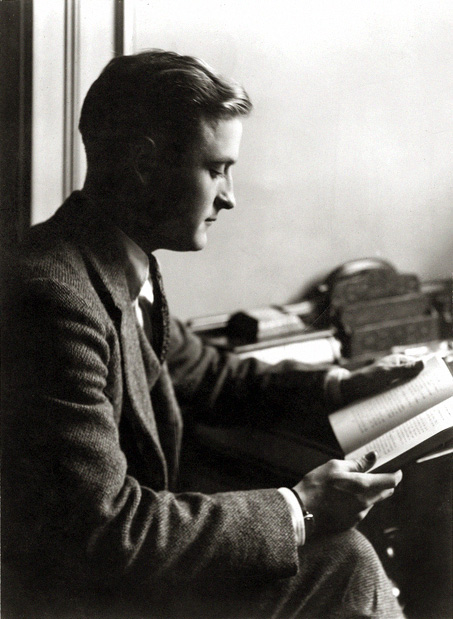The Curious Life of F. Scott Fitzgerald
F. Scott Fitzgerald [1] (1896-1940) was born on 24 September 1896 to a salesman father and an Irish-Catholic mother who was the heir to a successful Minnesota grocery store. The F. Scott of F. Scott Fitzgerald stands for Francis Scott; he was named for his distant cousin, the writer of the poem that became the lyrics to American national anthem. Until 1908 the family moved throughout upstate New York, but when his father lost his job the Fitzgeralds moved to St. Paul, Minnesota.
Scott, as family and friends knew him, had his first story published when he was 13 - a detective story printed in the school newspaper. After his expulsion for lack of academic effort, he boarded at Newman School, a Catholic school in New Jersey. After graduation in 1913, he attended Princeton University, where he wrote articles for the college humour magazine, stories for the literary magazine, and scripts for the musicals of the Triangle Club. However, again he neglected his studies; in 1917 he was placed on academic probation, and he dropped out of Princeton to join the army.
Shortly before reporting for duty Fitzgerald wrote his first novel, The Romantic Egoist, and although the publisher rejected it, Fitzgerald was encouraged to submit later works.
Zelda
While posted to Camp Sheridan in Alabama, then Second Lieutenant Fitzgerald met Zelda Sayre, daughter of an Alabama Supereme Court judge and society darling. The Great War ended in 1918, so Scott never was deployed to Europe. Zelda would not marry Scott until he could support her financially, and although he moved to New York to work in advertising and write short stories, she broke off the engagement.
Fitzgerald moved home to his parents to work on The Romantic Egoist. Recast as This Side of Paradise [3] it was accepted for publication in 1919. Zelda and Scott resumed their engagement, and the couple were married in New York a week after publication in 1920. Their only child, Frances Scott Fitzgerald, was born a year later.
 [4]
[4]
Writing & Celebrity
This Side of Paradise became an immediate hit. With literary success came wealth, and with wealth came the Fitzgeralds' new penchant for high living. Scott became known as a playboy and drank heavily, supporting himself largely through short stories published in popular magazines and papers like The Saturday Evening Post and Esquire. In 1922 Fitzgerald published his second novel, The Beautiful and the Damned [5]. It was this novel's satire of the Jazz Age that secured his position as a member of the Lost Generation [6]. However, Zelda and Scott lived beyond their means, embracing the decadent lifestyle of the New York celebrity, and Fitzgerald had to take out frequent loans from his literary agent and editor to avoid financial troubles. Like so many American writers after World War I, Fitzgerald moved to France, where he befriended fellow writer Ernest Hemingway. In France he wrote the now classic (then underrated) novel The Great Gatsby [7].
Decline & Death
In the 1920s Fitzgerald fell into severe alcoholism and suffered from writer's block, and Zelda's mental health deteriorated (in 1930 she was diagnosed with schizophrenia). The couple moved between Delaware and France, and Zelda was hospitalised in Switzerland and Baltimore. In 1932 Zelda published her semi-autobiographical novel Save me the Waltz. Scott was furious that she had drawn heavily on their life together, but would go on to do the same himself in his novel Tender is the Night [8] (1934), the story of an American psychiatrist married to a schizophrenic. The novel was a commercial disaster.
Fitzgerald's alcoholism, depression, and financial problems worsened, and after Zelda was placed in a North Carolina hospital in 1937, Scott left his wife behind and moved to Hollywood to try his hand as a screenwriter. In 1939 he began work on his final novel, The Love of the Last Tycoon, but died of a heart attack the following year without completing the work. He was forty-four, and considered himself a failure at the time of his death. It is only posthumously that he has been acknowledged as one of the greatest writers of the twentieth century. The Great Gatsby is a perpetual set text, and Fitzgerald's shrewd depiction of his degrading society is lauded.
Short story colleections
Flappers and Philosophers [10] (1920)
Tales of the Jazz Age [11] (1922)
All the Sad Young Men [12] (1926)
Taps at Reveille [13] (1935)
Short Stories [14] (1989)


